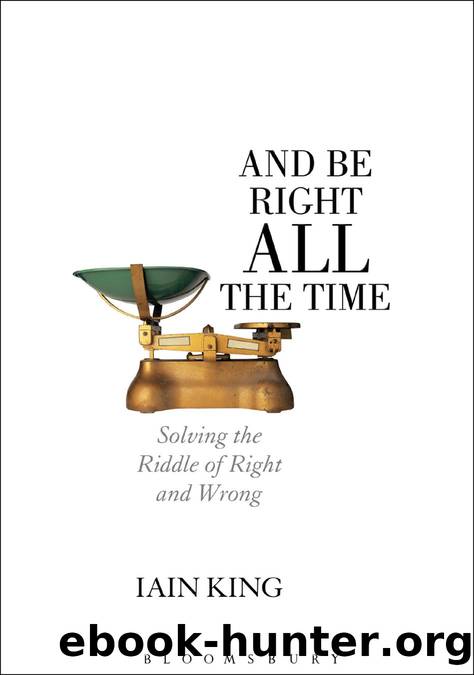How to Make Good Decisions and Be Right All the Time by King Iain;

Author:King, Iain;
Language: eng
Format: epub
Publisher: Bloomsbury Publishing Plc
Published: 2019-12-18T00:00:00+00:00
21 The New Ladder to Humility
Helping people isnât just a transaction. It is about kindness, generosity and sometimes humility. But should it be? Is helping other people with humility any better than helping people with brashness?
This question was the topic of a ladder of charity, drawn up by a Jewish theologian in the twelfth century called Moses Maimonides. Maimonides examined help to others, âtzedakahâ as he called it, and ranked different forms into eight levels. The lowest form of help involved giving grudgingly and immodestly. Help improves, moving up the ladder, if it is given anonymously, and if the benefactor does not know the recipient. Help given without a request is even higher up the ladder. The highest form of help, according to Maimonides, is to form a partnership with the person in need, strengthening them on a sustained basis until they are self-sufficient. By Maimonidesâ analysis, a blood donor who donates anonymously, not knowing who she is helping and not expecting any sort of commendation for her efforts is giving a much better quality of help than someone who reluctantly puts money in a tin rattled in front of her to be rewarded with an âI gave money to charityâ sticker.
Maimonidesâ ladder seems to rise above the crude Help Principle, which just compares the value of help between two people, donor and recipient. Modesty, anonymity and all the other important qualities identified by Maimonides seem to be ignored. We need to know whether the Help Principle and Maimonidesâ ladder can be reconciled.
The answer emerges from a slightly odd phenomenon: when you apply the Help Principle, you change the situation you are in. Imagine I have lots of potatoes and you are very hungry. Both of us apply the Principle to each other. The Help Principle says I should give some of my potatoes away, because each one will be worth much more to you than it is to me. So, I give you a potato, then another, and another, and so on. As I give you more and more potatoes, each extra potato will be worth less to you as you become less hungry (generally, the more you have of something, the less valuable you find each item of it to be). At the same time, as I give my potatoes away, my remaining potatoes will become more precious to me. After a time, I might be in danger of becoming hungry myself. Eventually, the next potato Iâm about to give away will be worth about the same to you as to me, at which point the Help Principle no longer applies, and I should stop giving them away. Giving away potatoes once reduces the case for giving away more potatoes because each remaining potato becomes more valuable to me and less valuable to you. Applying the Help Principle changes the relationship between two people and reduces the case for applying it again in the future.
If we help each other in line with the Help Principle but fail to complete the full process, one or other of us may feel our generosity had not been reciprocated.
Download
This site does not store any files on its server. We only index and link to content provided by other sites. Please contact the content providers to delete copyright contents if any and email us, we'll remove relevant links or contents immediately.
The remains of the day by Kazuo Ishiguro(7575)
Tools of Titans by Timothy Ferriss(6964)
The Black Swan by Nassim Nicholas Taleb(6203)
Inner Engineering: A Yogi's Guide to Joy by Sadhguru(5910)
Giovanni's Room by James Baldwin(5893)
The Way of Zen by Alan W. Watts(5809)
The Six Wives Of Henry VIII (WOMEN IN HISTORY) by Fraser Antonia(4799)
The Power of Now: A Guide to Spiritual Enlightenment by Eckhart Tolle(4767)
Astrophysics for People in a Hurry by Neil DeGrasse Tyson(4627)
Asking the Right Questions: A Guide to Critical Thinking by M. Neil Browne & Stuart M. Keeley(4599)
12 Rules for Life by Jordan B. Peterson(3745)
The Ethical Slut by Janet W. Hardy(3511)
Skin in the Game by Nassim Nicholas Taleb(3477)
Housekeeping by Marilynne Robinson(3419)
The Art of Happiness by The Dalai Lama(3391)
Double Down (Diary of a Wimpy Kid Book 11) by Jeff Kinney(3284)
Skin in the Game: Hidden Asymmetries in Daily Life by Nassim Nicholas Taleb(3271)
Walking by Henry David Thoreau(3236)
12 Rules for Life: An Antidote to Chaos by Jordan B. Peterson(3209)
